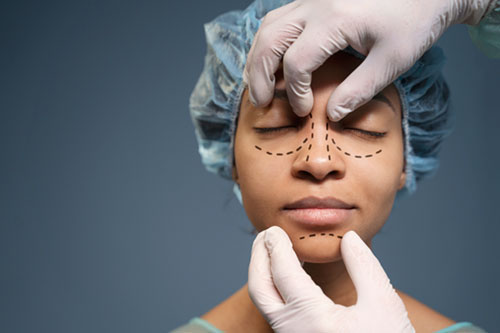Premier Plastic Surgery Seattle: Accomplish Your Visual Goals
Premier Plastic Surgery Seattle: Accomplish Your Visual Goals
Blog Article
A Deep Dive Into the Usual Justifications for Seeking Aesthetic Surgical Treatment: Unloading the Need for Adjustment and Self-Improvement
The motivations behind the search of plastic surgery prolong past plain visual improvement, mirroring a nuanced interplay of social expectations, personal desires, and emotional factors. As people significantly look for to align themselves with prevailing elegance requirements, it becomes necessary to take a look at the underlying reasons that urge them to make such considerable changes. The influence of media representations and individual stories can not be forgotten, as they shape assumptions and wishes in profound methods. This evaluation motivates critical inquiries about the moral ramifications and future trajectories of cosmetic treatments, inviting additional exploration into the intricacies of self-improvement and identification.
Societal Pressures and Appeal Criteria

The effect of these elegance ideals can be extensive, instilling a feeling of inadequacy in those who do not conform. As a result, lots of might seek plastic surgery as a means of aligning their look with these social assumptions. mommy makeover bellevue. This need for consistency can come from a vast range of inspirations, consisting of the goal for enhanced social condition, improved charming leads, or raised professional chances
Moreover, these stress are not limited to particular demographics; they impact individuals throughout various ages, genders, and histories, highlighting the pervasive nature of appeal criteria. This prevalent impact elevates vital inquiries regarding the principles of cosmetic surgical procedure and the implications of social criteria on private options. Ultimately, understanding these pressures is crucial for fostering an extra comprehensive meaning of charm that celebrates diversity.
Individual Experiences and Transformative Stories
Several people that go through plastic surgery report transformative experiences that extend past simple physical modifications. For numerous, these treatments work as a stimulant for boosted self-worth and a renewed sense of identity. Clients frequently explain feeling liberated from long-lasting insecurities, causing raised self-confidence in both personal and specialist worlds.
Take, as an example, the tale of a young female who underwent breast augmentation after years of sensation awkward regarding her appearance. Post-surgery, she reported not only a newfound convenience in her body but additionally a considerable improvement in her social life and career possibilities. Similarly, a middle-aged male who chose to undergo a renovation shared exactly how the procedure rejuvenated his outlook on life, motivating him to go after new interests and relationships.
These individual stories highlight the extensive impact plastic surgery can have on people' lives. As they embrace their transformed selves, many discover empowerment in their selections, commonly using their experiences to motivate others contemplating similar trips. Inevitably, these transformative stories highlight the diverse factors individuals seek cosmetic surgery, linking individual development with the pursuit of visual improvement.
Psychological Aspects Behind Plastic Surgery
Various emotional factors contribute to the decision to undergo cosmetic surgical treatment, mirroring much deeper psychological and psychological health and wellness factors to consider. Individuals commonly go after surgical enhancements as a means to address feelings of inadequacy, low self-esteem, or dissatisfaction with their appearance. These psychological motivations can be rooted in past experiences, social comparisons, or personal ambitions.
Body picture distortion is a widespread issue, where individuals view their physical attributes in an exaggeratedly unfavorable light. This distortion can bring about obsessive thoughts about viewed defects, prompting the need for medical her comment is here alteration as an option - mommy makeover bellevue. In addition, the pursuit of excellence and social pressures can enhance these sensations, pushing people toward aesthetic procedures in hopes of achieving an idealized variation of themselves
Additionally, the principle of self-improvement plays an essential duty. Numerous people watch plastic surgery as a pathway to enhance their quality of life, thinking that boosted appearance will certainly result in increased social approval, better partnerships, or enhanced occupation opportunities. Inevitably, the psychological aspects behind plastic surgery underscore the complicated interplay in between individual self-perception and exterior influences, exposing the complex nature of the desire for adjustment.

The Function of Media in Perception
In today's culture, media plays a critical duty in shaping perceptions of appeal and self-respect. Through numerous platforms-- social networks, tv, and advertising and marketing-- idealized standards of beauty are usually shared, affecting specific ambitions and self-image. These representations regularly stress narrow definitions of appearance, primarily including vibrant, slim, and digitally enhanced pictures, which can create unrealistic standards you can try this out for individuals aiming to adjust.
The effect of media is more intensified by the prevalent nature of social media, where customers are pestered with curated content that highlights cosmetic improvements, endorsing a culture of contrast. This consistent exposure can result in sensations of insufficiency among customers, prompting them to think about plastic surgery as a way of accomplishing the perceived suitable. Study indicates that people who involve with these media depictions are much more most likely to reveal discontentment with their look, reinforcing the need for surgical treatments.
Additionally, the normalization of cosmetic surgical treatment in media stories can desensitize audiences, framing such treatments as commonplace and even required for social acceptance. Therefore, the media's representation of elegance not just influences private options regarding plastic surgery yet additionally adds to a broader societal dialogue concerning self-worth and identification.
Ethical Factors To Consider and Future Trends
In the middle of the expanding popularity of cosmetic surgical treatment, ethical considerations bordering the technique have ended up being progressively prominent. As the demand for treatments climbs, so as well do issues concerning informed authorization, the emotional motivations of patients, and the possibility for exploitation by specialists. It is vital for professionals to guarantee that people totally comprehend the benefits and threats, in addition to the implications of their selections, to promote a responsible strategy to aesthetic enhancements.
In addition, webpage the influence of social media and elegance requirements questions about the influence on mental health, specifically among susceptible populations. As awareness of body image issues grows, honest practice demands a careful analysis of the motivations behind medical treatments. Specialists must balance person desires with honest duty, guaranteeing that choices are rooted in real self-improvement rather than societal stress.

Conclusion
To conclude, the pursuit of plastic surgery is influenced by an assemblage of societal pressures, individual experiences, and psychological aspects. The desire for positioning with dominating charm standards, paired with the capacity for transformative end results, emphasizes the complicated inspirations driving individuals towards these treatments. Additionally, the function of media fit perceptions of charm can not be downplayed. As moral factors to consider evolve, future patterns in plastic surgery will likely mirror recurring social dialogues surrounding self-improvement and individual identity.
Often, social stress and prevailing beauty criteria play a considerable function in people' choices to seek cosmetic surgical procedure. Ultimately, these transformative stories highlight the multifaceted reasons people seek cosmetic surgery, linking individual growth with the quest of visual enhancement.
Lots of individuals watch cosmetic surgery as a path to enhance their top quality of life, thinking that boosted appearance will lead to raised social acceptance, far better relationships, or improved job possibilities. Eventually, the mental factors behind cosmetic surgery emphasize the complicated interplay in between private self-perception and outside impacts, disclosing the multifaceted nature of the need for modification.
As honest considerations progress, future trends in cosmetic surgery will likely show continuous societal discussions surrounding self-improvement and specific identity.
Report this page